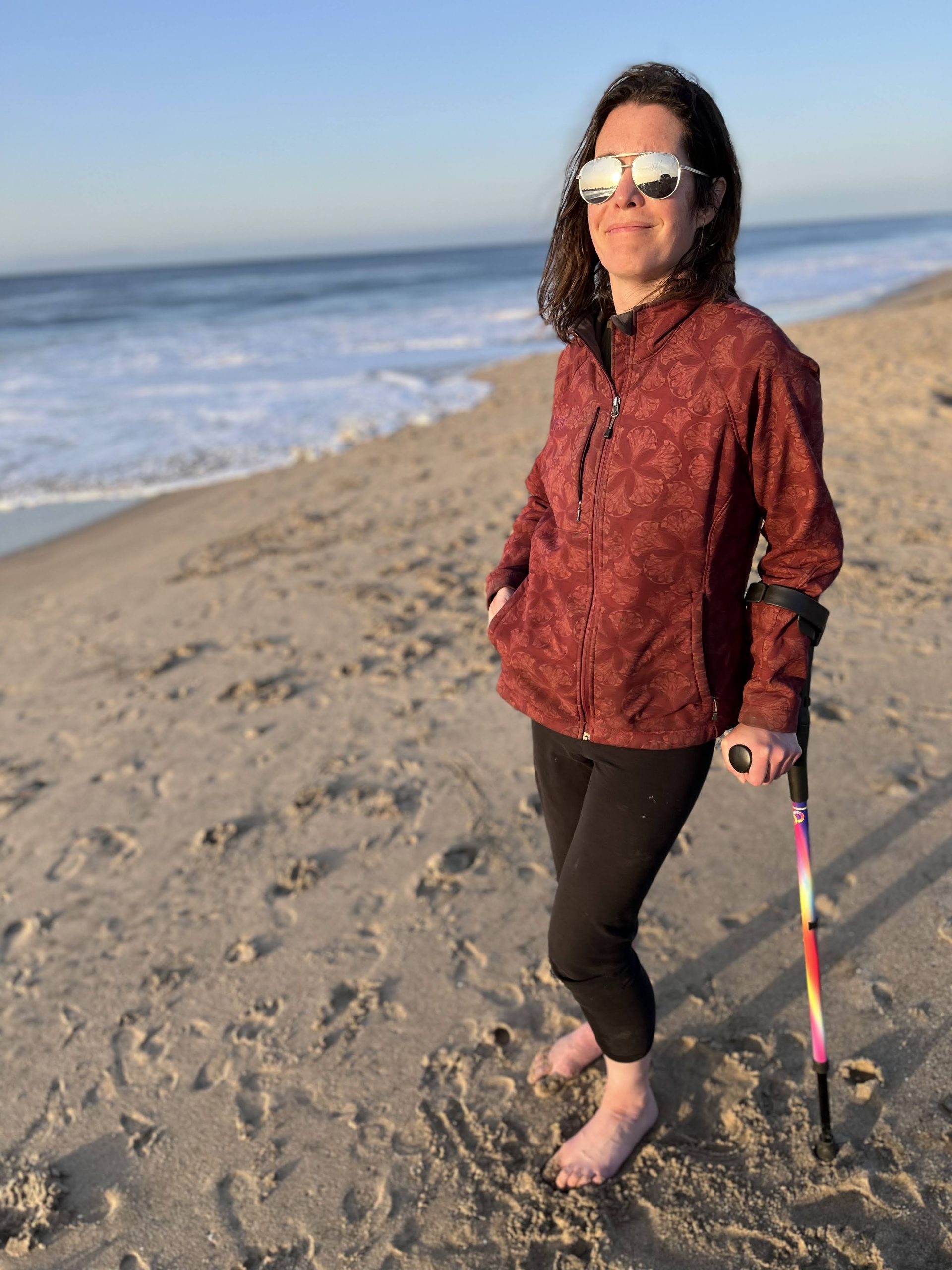Persistent tingling in her arms and legs, difficulty putting on her shoes and trouble urinating: these were symptoms Sutter patient Pamela Swint began experiencing in 2019. At first, like loose pieces of a jigsaw puzzle, these symptoms seemed indecipherable on their own. However, further testing later revealed a clearer picture and a startling diagnosis: multiple sclerosis (MS), a chronic and degenerative disease of the brain and spinal cord.
Putting the pieces together
The 43-year-old Redwood City, CA resident and mom to two kids initially thought her symptoms stemmed from a herniated disk in her back.

Pamela Swint
“When my symptoms did not improve and progressed to the point where I had trouble walking normally, I knew something was wrong,” reflects Pamela.
So in 2020, Pamela’s neurosurgeon in San Jose, Dr. Kenneth Blumenfeld, recommended performing an MRI and lumbar (lower back) puncture test to help accurately determine the root of her health concerns.
Test results paired with a thorough medical history showed Pamela had developed a form of MS called primary progressive MS (or PPMS)—a type of the illness where neurologic functions get steadily worse from the start, even in the absence of symptom flare-ups (also called relapses or attacks).
She was referred to specialty care at Sutter Health’s recently launched MS center at the Palo Alto Medical Foundation (PAMF), where Dr. Ariele Greenfield and her Sutter colleagues are focusing on new approaches to treat and study MS.
Pamela’s doctors initially recommended treatment with Ocrevus® (ocrelizumab), a drug approved by the U.S. FDA to treat certain forms of MS including PPMS. Keen to explore additional options for medications that might slow the progression of her illness, Pamela recalled reading about clinical trials that had given other MS patients new hope beyond the standard-of-care.
“There is a lack of approved therapies to treat PPMS. And I strongly believe the reason we have any approved drugs on the shelves is because of people who have participated in clinical trials. Their participation in research helped lead to new treatments evaluated in these studies,” says Pamela.
Research at Sutter: uncovering clues for new hope
She talked to Dr. Greenfield about options to participate in clinical trials suitable for her type of MS. The doctor informed her about ongoing studies including a Phase 3, randomized study called FENtrepid. The study is testing a new, investigational drug (fenebrutinib, a twice-daily pill taken orally) compared to intravenous ocrelizumab already used in adult patients with PPMS.

Dr. Ariele Greenfield
Fenebrutinib is a small molecule designed to slow MS progression by preventing certain immune cells from accelerating the inflammation that damages nerve cells in the brain and spinal cord.
“Even though there are many drugs currently available that target the inflammatory mechanisms associated with MS relapses and worsening symptoms, to date ocrelizumab is the only medication indicated for PPMS,” says Dr. Greenfield, a neurologist and director of the MS center at PAMF. “As a result, the main feature of disability progression in all forms of MS remains under addressed, and treatments that can stop or delay MS disease progression represent a serious unmet medical need. I am proud that Sutter participates in clinical trials of new MS drugs that may broaden what is possible when we care for individuals with MS.”
As part of the clinical trial, Pamela and other study participants will be followed regularly to ensure their safety and to assess disease status.
Pamela remains hopeful that her participation in this important study will uncover new clues about optimal treatment for MS for her and other individuals with the illness. “I’m happy to be able to ‘pay it forward’ in this way and bring new hope for a better quality of life for people who are living with MS,” says Pamela.
Finding the care you need
People with MS may benefit from integrated care involving a team of specialists across the disciplines of neuro-ophthalmology (eye), urology and urogynecology, psychology, pain management, physical therapy and rehabilitation. Team-based care, like the care offered by Sutter Health and Palo Alto Medical Foundation, is especially important for people with neurologic disorders as multiple parts of the body can be impacted, causing weakness or poor muscle coordination that impairs common functions like walking, speaking and eating.
Discover Sutter Research and Clinical Trials
Dive Deeper into MS
Dr. Ariele Greenfield conducts clinical trials at Sutter’s Palo Alto Medical Foundation (PAMF) and she directs the PAMF Multiple Sclerosis Center, a National MS Society-designated Partner in Care Center. Focusing on MS, which affects almost 1 million Americans, Dr. Greenfield has been recognized by the National MS Society for seeking advancements in MS patient care and research. Along with colleague Dr. Joanna Cooper, Sutter neurologist and medical director of research at Sutter’s Alta Bates Summit Medical Center, Dr. Greenfield was recognized by the National MS Society for being among women across the U.S. making groundbreaking progress in the treatment and understanding of MS.
In addition to cutting-edge research including the FENtrepid clinical trial (in which Pamela, in our accompanying story, participated), Dr. Greenfield has studied how specialized immune cells in the brain called B cells can evade many MS therapies when they are found in and around the brain. Accumulation of B cells has been linked to MS and other autoimmune illnesses.Dr. Greenfield, along with her co-inventors, has received a European Patent on a new method for studying these immune cells.
“It is an honor to care for individuals with MS, to provide long-term support, well-rounded treatment plans, and empower those with MS with the latest information,” said Dr. Greenfield.
Because the specific cause of MS remains unknown and the disease has no cure, the progression, severity and specific symptoms of MS in any one person cannot yet be predicted, and the treatment options vary accordingly. But advances in research and treatment are leading to a better understanding of the elusive disease, and hopefully moving us closer to a world free of MS.
Sutter Health has participated in innovative clinical trials like those led by Dr. Cooper and Dr. Greenfield for decades, aiming to accelerate the discovery of new treatments for MS. Collaborating with researchers across the country and around the world, Sutter’s clinical trial sites throughout Northern California offer patients enrollment in a wide range of phase 1-4 clinical trials in cancer, neurological disorders, transplant medicine, cardiovascular diseases, diabetes, and other illnesses. To learn more about participating in Sutter’s clinical trials visit Sutter Health Clinical Trials.





